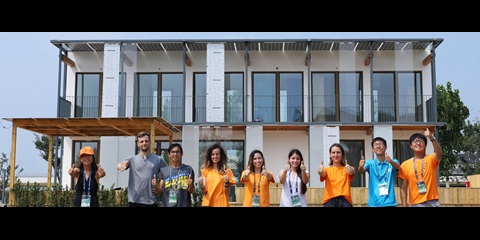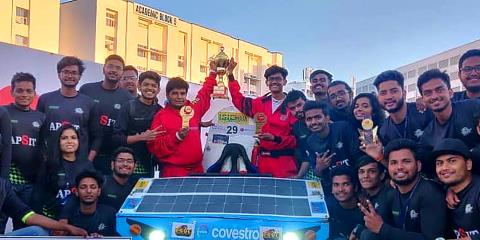
UNDESA features Covestro solutions as 'UNSDG Good Practices'
In this context, making agriculture more productive and remunerative is the need of the hour. There can be no better time to establish partnerships for improving access to post-harvest technology, market-linkages, finances & trainings to beneficiaries to create “agro-entrepreneurs”, with special efforts taken to increase participation of women. This can support a consistently rising, inclusive and sustainable growth trajectory for the country. Other key initiatives in this direction include developing commodity-based clusters, promoting innovation, research & development in food security and undertaking capacity building to enhance competitiveness of food processing industry. These measures directly contribute towards the mission of ‘doubling farmers’ income by 2022’ by the Govt. of India and the United Nations Sustainable Development Goals (UNSDGs).
Covestro is a world leading supplier of high-performance polymer materials that are innovative, diverse and sustainable. Covestro's Inclusive Business (IB) works in consortiums comprising of diverse partners and stakeholders to bring about a 'sustainable social transformation' for the underserved communities in alignment with the UNSDGs. It believes that by leveraging the collective strength of its partners, the consortium can add substantial value towards improving the livelihood opportunities for small and marginal farmers by creating a holistic post-harvest ecosystem that empowers them with:
- Evaluation and assessment study by the concerned state governments/NGOs/professionals to identify the most appropriate locations where the post-harvest food security ecosystems can be impactful for improving the earning capabilities of the small farmers, Covid-19 impacted workers and underserved communities
- Post-harvest technology that is efficient, sustainable and cost-effective to reduce wastage of farm produce by increasing their shelf-life without impacting the nutrient-value of food. This is achieved through the use of solar conduction dryers, solar greenhouse dryers & solar cold storages at the farm level (decentralized)
- Market linkage for different commodities with a special focus on exports to realize improved earning capabilities for small and marginal farmers. This market linkage will reduce the middle-men in the value chain and will empower the farmers to sell their produce directly to the global markets
- Skill development and training in best practices for various activities in the agro-value chain like research and development, cutting, sorting, grading, packaging, logistics, storage-management etc. The experience and expertise of state agriculture universities/institutes will be leveraged for this activity
- Food Security Digital Platform is a digitally smart initiative to be made available in English and vernacular languages. The aim of the platform is to digitally empower the small and marginal farmers by providing them single-window access to post-harvest technology, financial assistance, market linkages & product certification like services at their own conveniences.
Additionally, Covestro is promoting climate resilient agriculture at high altitude regions through the deployment of solar greenhouse cultivation domes for growing indigenous crops to ensure food security for these regions.
Covestro led consortium approach has demonstrated its capability in contributing positively towards 'doubling farmers income by 2022' in several states in India with pivotal support from the Horticulture Departments (Govt. of AP), Department of Agricultural Marketing & Agri-Business (Govt. of Tamil Nadu), Ladakh Autonomous Hill Development Council etc. along with relevant stakeholders like agro-technology enterprises, market linkage providers, agri-finance practitioners, farmers, Farmer Producer Organizations (FPOs) and NGOs etc. Its work has been recognized by international organizations like the KFW-DEG (German Development Bank), Solar Impulse Foundation and the most recently by the United Nations Department of Economic and Social Affairs (https://sdgs.un.org/partnerships/improving-earning-capabilities-small-marginal-farmers-through-solar-post-harvest)
Based on this ecosystem, Covestro was able to revive an entire community of 5000 farmers. Located in Tamil Nadu, Thottiyam is renowned for its banana farms but lacks ways to process its produce and protect it from the vagaries of climate and inclement market forces. To effectively address the stated challenges, Covestro launched a Public Private Partnership project called SUSTAIN co-funded by KFW-DEG (the German Development Bank). It identified such communities and went on to offer simple yet innovative technologies such as farm-based solar greenhouse dryers (GHD) and solar cold storages. This has helped create opportunities for farmers by allowing them to preserve their produce for a longer time. The Solar Green House Dryer (GHD), which uses Covestro’s polycarbonate, became an instant success and so far, 1000+ units have been installed in Indian Subcontinent, ASEAN and Africa. GHD dries various products including fruits, vegetables, spices, fish etc. in a hygienic manner, allowing the farming communities to open new revenue streams. The Banana fruit is dried in the state-of-the-art Green House solar driers to reduce its water content without loss of any of its nutrients. This process is clean and cost effective. The dried fruit has a good keeping quality, taste and shelf life. This venture is one of the earliest of its kind on a commercial scale. Two years down the line from when the project first started, the farmers were able to significantly increase their revenue, in addition to achieving a positive shelf-life as significant amount of Banana was getting wasted due to the lack of processing and infrastructure. In short, this dried banana now serves as mid-day meals, snacks and more, providing the required nutrition to children, young mothers and diabetic patients. It has unleashed the entrepreneurial attitude of the farmers. These products are also available in the market and on leading e-commerce platforms.
In order to further consolidate this shared vision in these challenging times, Covestro forges partnerships with organizations that can add value to the above-described ecosystems in India, Sri Lanka, Nepal and Bangladesh. Such interventions will empower small & marginal farmers to become successful entrepreneurs through well-defined and customized projects. It will help improve the lives of thousands of people in distress. With active support from all stakeholders, together, Covestro is delivering successful and result-oriented models that can be replicated quickly across geographies.
About UNSDG Good Practices:
Five years into the implementation of the 2030 Agenda and the Sustainable Development Goals (SDGs), many Governments, UN entities, international and regional organizations, and stakeholders from all sectors, have accumulated experiences and lessons learned towards the implementation of the SDGs. What are the inspiring breakthroughs and success stories that are showing results and impacts? What are the good practices that can be replicated and scaled up? What are the gaps and constraints and how should we address them? Looking ahead, what steps should we take to accelerate progress? To help answer these and other questions, the United Nations Department of Economic and Social Affairs (UN DESA) launched calls for submissions of good practices, success stories and lessons learned by all stakeholders in the implementation of the 2030 Agenda and the SDGs. Completed submissions were received & reviewed by a team of experts from United Nations entities. The results are now available in an online database of more than 450 SDG good practices from all over the world and implemented by governments and stakeholders from different sectors and addressing the 17 SDGs.
Find out more about the SDG Good Practices Initiative here: https://sdgs.un.org/sdg-good-practices












